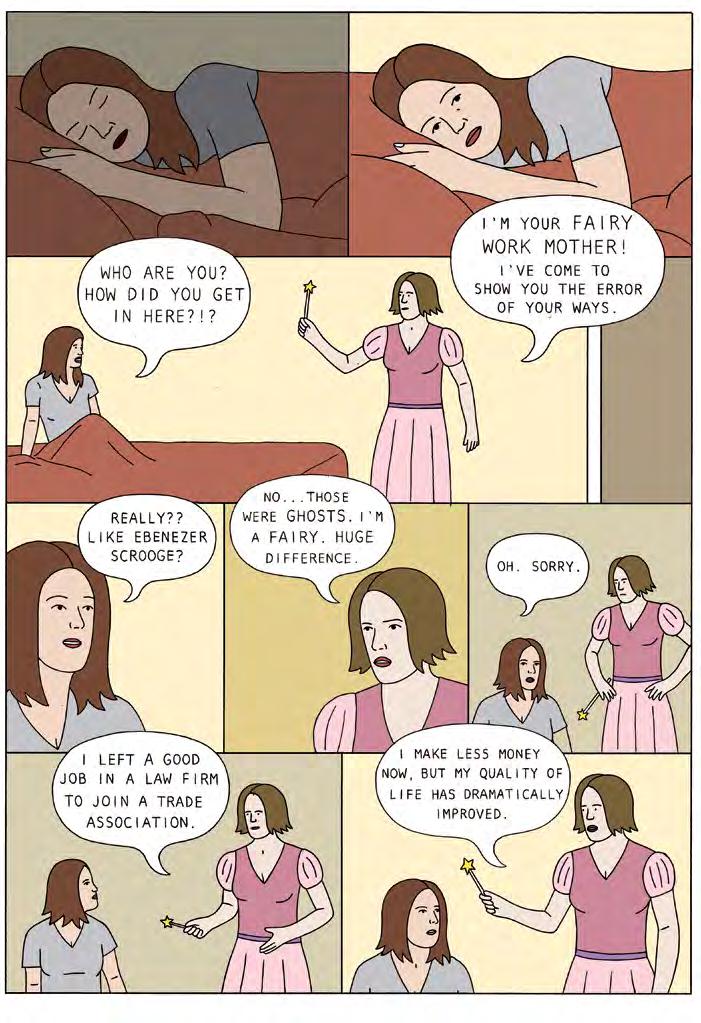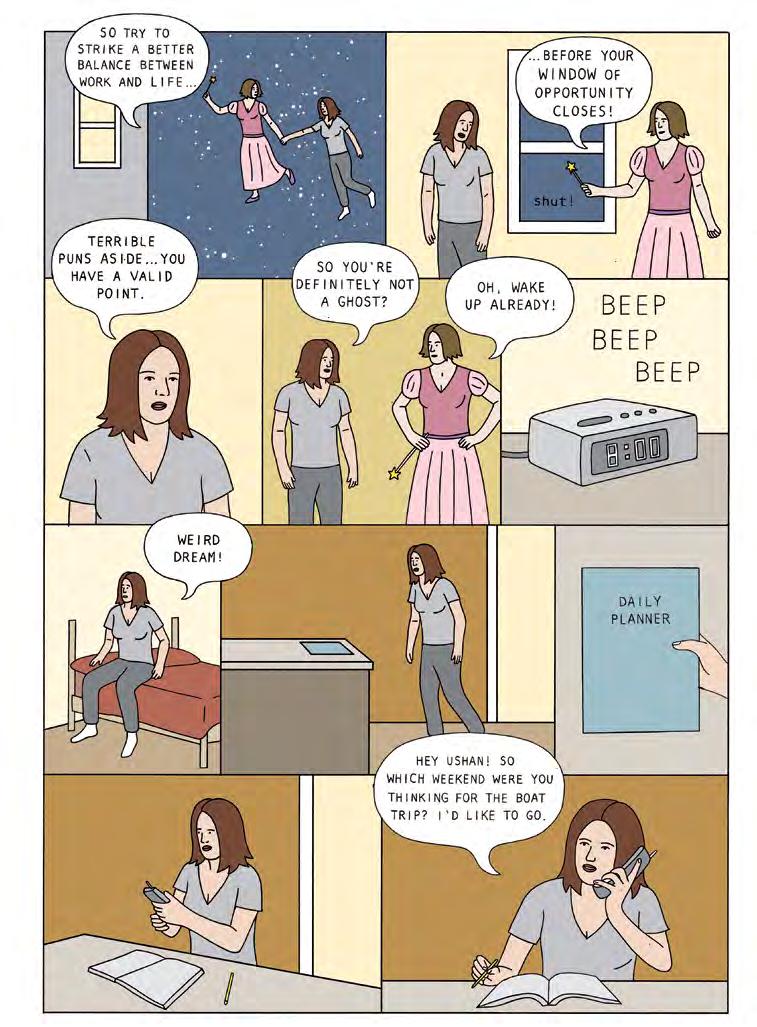
8 minute read
Joining the Company
from TWSM#9
Joining the Company Dangerous Jobs
Running in the Fast Lane
Advertisement
By MICOLE IMPERIALI
Dangerous jobs are opportunities that some people have to or want to experience in their lives; it may be for the benefits gained, for significant career advancement or for the many doors a dangerous job can open. But such jobs are certainly not for the fainthearted.
Chris McManus and Franco Lamolinara were engineers working in Nigeria when they were abducted and murdered last May allegedly by an Al Qaeda cell. Working in dangerous countries or in dangerous roles is an option or a necessity for many, but the sacrifices are great. We asked global executive search firm SpenglerFox for some insight.
DANGER, DANGER: HIGH VOLTAGE!
Nicolas Bordry, Country Manager for Russia and CIS, says Russia has many dangerous areas, especially because of severe weather, such as in Siberia where the thermostat often hits -50°C. Danger is prevalent in conflict-ridden areas such as Ossetia and near the Chechnyan border. But you don’t have to travel far to find dangerous work situations; for example, Moscow construction sites where companies don’t have high health and safety standards and officials are open to bribery. As far as procedure, Bordry says “companies look for potential candidates inside first, to save extra cost, and if no one is available they’ll then look outside, but that is for any job, not only dangerous [jobs].” In Russia, it is difficult to find foreign candidates because of the language barrier. Nancy Brown, Marketing Development Manager, says “most companies looking to send employees to dangerous countries work on referrals; they may ask for volunteers, approach those people who are most appropriate within their company to transfer and then also ask for referrals.” Mary Kramer, Regional Manager, Greece and Balkans, hasn’t recruited for such jobs. She says “in the Greece and Balkans market, as well as in the rest of the EU, recruitment for such jobs is hardly a reality.” It is different in the Middle East. Says Cedric d’Halluin, Regional Manager, Middle East, there are two ways for companies to find potential candidates, “there are people who are currently employees of a company and to enhance their career are offered an assignment for 2 or 3 years in a fast growing market but where conditions are dangerous.” This includes, for example, Iraq and Iran. But Egypt is now considered dangerous though it wasn’t a few years ago, as are Nigeria and Mali, where conditions have worsened recently. Also, companies “can work with companies like ours to recruit externally and attract the best people to those markets,” says d’Halluin.
A BENEFICIAL MOVE?
D’Halluin says benefits vary. Those who accept assignments are offered more money and faster access to better positions upon returning. “Nobody really wants to move to a dangerous place just for the sake of the adventure. Especially at the senior level, [they] are driven by cash,” says d’Halluin. People in their late 40s and early 50s are good candidates because they have experience. Plus, they may need money to send their kids to college or to help fund retirement. There are other benefits, he says, “for example a European general manager in the pharmaceutical industry based in Pakistan negotiated permanentlybooked flight tickets to Europe. There are some companies specialized in providing security, so if you’re operating in remote areas in dangerous countries they will provide medical assistance, planes for evacuation, or protection and bodyguards. The oil and gas sector is very exposed to that, because professionals often work in very remote locations, far from towns, and the local population lives in a very poor situation next to a camp of expats, and that creates risk.” Though salary is a main driver in the US, in Russia the salary doesn’t increase much as companies pay for expertise and not to compensate for dangerous living conditions. Bordry says “companies are sending people to Russia with short-term assignments and that means up to 24 months” and adds “with some extra benefits such as extra holidays and trips, hardship allowance, food and accommodation provided by the company and medical/life insurance.” The South American market offers benefits such as “a bodyguard if the executives work in zones considered to be of medium to high risk” says Carole Tynan, Country Manager at SpenglerFox. According to Hasan Bosnak, Practice Group Lead at SpenglerFox Turkey, compensation is higher than in mature markets. Additionally, workers have better health insurance, covering a range of risks.
WHO’S WILLING? European HR professionals often complain about lack of mobility. People want international exposure, but when it comes to moving, things change. On the other hand, as d’Halluins says, “people from emerging markets are extremely eager to take opportunities not necessarily existing in their own countries.” Kram-
SpenglerFox, part of Grafton Employment Group, is a globally networked Executive Search and Human Capital Solutions firm. Founded in 2003, SpenglerFox works with some of the world’s
most forward-thinking organizations across a completely integrated and wholly-owned network of offices in 17 countries.
Cedric d’Halluin
is Regional Manager Middle East at SpenglerFox
Carole Tynan
is Country Manager at SpenglerFox Chile
Mary Kramer
is Regional Manager Greece & Balkans at SpenglerFox
Hasan Bosnak
is Industry Practice Lead at SpenglerFox Turkey
Nicolas Bordry
is Country Manager Russia and CIS at SpenglerFox
Nancy Brown
is Group Marketing Manager at SpenglerFox
er says this is due to three factors; first, Asians or Africans from emerging areas are more familiar with dynamic markets with a wide diversity of wealth, background and ethnicity; second, Asians and Africans accept relocation to dangerous areas as a door for future opportunities in the otherwise-impenetrable Western market; and third, Europeans are less willing to give up a lifestyle, compared to Asians or Africans who are more prepared to leave their families short-term for significant long-term gain. D’Halluin thinks this phenomenon is due to how perception of danger varies between East and West, “ someone from the EU would consider dangerous anything starting from Russia, but if you ask someone from Somalia, pretty much any place on Earth is safer than their own country.” Brown says Americans are unwilling or unmotivated to relocate as they may feel vulnerable as Americans abroad; they have concerns about diseases, living conditions, personal safety and lifestyle; and because most don’t have a passport.
PROFILES WANTED
In Russia, Bordry says, sales and technical staff are most needed. For North American companies, the most-searched profiles are for those able to train others, senior managers, executives and highly skilled workers. Sectors seeking workers are “engineering, security, humanitarian aid/support, and manufacturing,” Brown says. In the Middle East, a range of workers is needed, “when a country needs to be rebuilt, it starts with gas and power stations, airports, roads. So the first to enter the market are cement producers and large multinational engineering companies.” Bosnak agrees, “construction and energy production are key industries which generally take part in the establishment/reestablishment of the infrastructure in ‘dangerous countries.’” Leadership as well as low and mid level technicians are in demand. These workers must be highly motivated, flexible, adaptable, stress-resistant, creative and highly ethical. Bosnak says “senior executives in sales and production with cross cultural experience in establishing, developing and managing local operations are preferred profiles,” and adds “chemicals, pharmaceuticals, industrial equipment and products and consumer goods are the main industries.” In South America, oil and mining industry workers are most sought after. Tynan explains, “Colombia is also receiving an interesting level of investment from abroad in these industries and this involves searches in international markets.”
PROBLEM ALERT
Recruitment can be difficult. Candidates find it hard to convince their families. Organizations must learn what motivates a candidate to accept a job; money is an important driver but not the only one. Often people accept because they think money will be enough, but after a few months, they realize they cannot handle the stress. D’Halluin says “what happens is that professionals accept the assignments for the money, but don’t assess the situation fully. This sometimes is also the company’s fault, as it is good to relocate people, but you also have to make sure that those same people are very clear on what they are signing for.” Another difficulty companies encounter is replacing people once their contracts are up. “Companies will do pretty much everything to have people stay another year or so,” says d’Halluin. Difficulties in Russia are similar, Bordry says, “the first problem is to find candidates interested to take risks and to be located there. Then the main problem becomes the package, because candidates know that they are in good positions to negotiate with their potential employer and ask for too much; and on the other hand employers refuse to go above certain numbers.” Bosnak says there is a range of problems involved. Security is a major one, as is schooling, social life and language barriers. Companies often turn to Turkish applicants, since, Bosnak says, “many companies try to bypass these problems in recruiting talent from countries with closer cultural backgrounds than people from Western Europe.”•
The cartoon on the two following pages is by Robert Sergel, a cartoonist currently residing in Cambridge, MA, USA. He graduated from college in 2005, and his work has appeared in publications such as New York Press, Noo Journal, Zine Arcade, Free Comics NYC and in The Wellesley Townsman, among others. Comics aside, Robert plays in a band called The Channels. Robert has freely interpreted the stories of managers Ozlem Sevilkan, Vicky Bouzouki, Amy Duvall, René Canales, Yann Quiniou, Keily Dibugnara and Kyriakos Kofinas, all connected to SpenglerFox. The story is invented and references to reality are purely imagined. The moral of the story is that there is much more to life than working and money. Life is way too short to not consider our own emotional welfare, sanity and well-being, so never forget about your private life and always make room for your interests, hobbies and loved ones.



Private Eye: The Business Side of Style
• Design Ideas: Design Guild Marks 2012 • People to Watch and Know
Karen Berger, New York, photos by Jodi Jones Seung Jae Baik, Seoul, photos by Thomas Vanhaute Tasia Iliopoulou, Athens, photos courtesy of Cho, Oyu 2009 expedition
• Our Choices: Ideas for Free Time • The Movie: In Time










